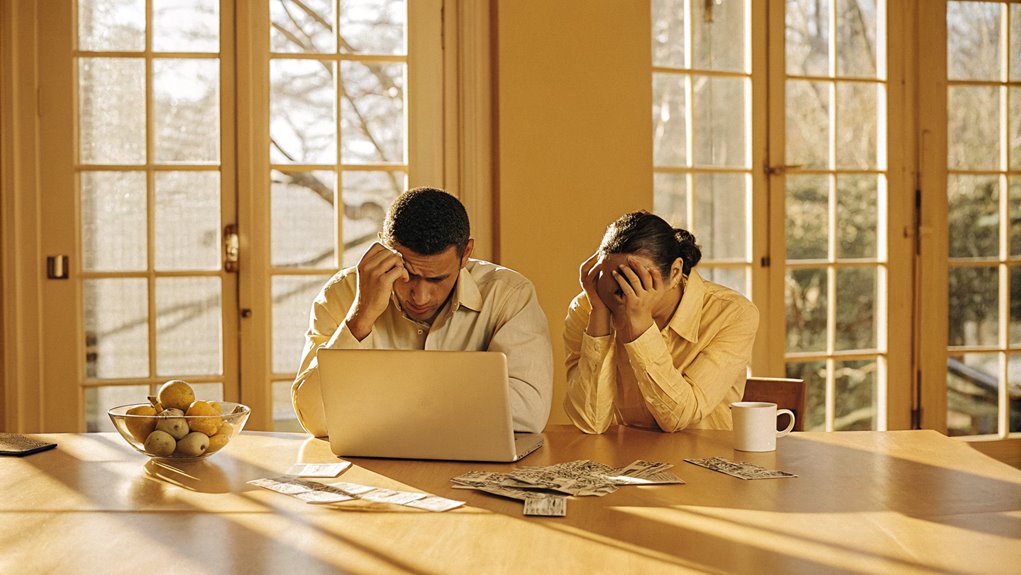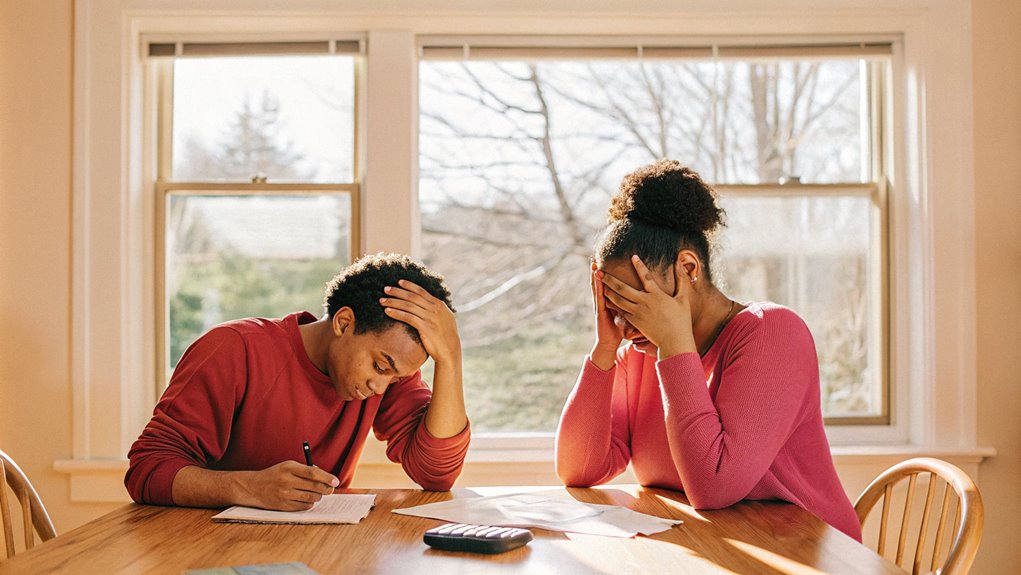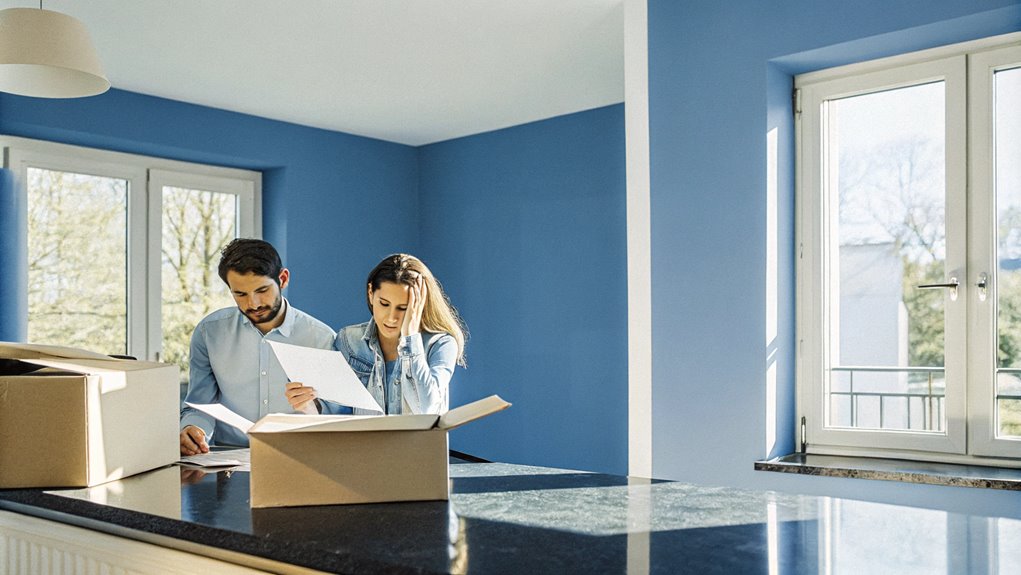Your home should not cost so much that it leaves you broke. When you spend too much on your house – more than a third of what you make each month – bad things can happen. You might not have money saved for when times get tough. You may need to use credit cards just to buy food or fix things that break. This can make you feel very stressed.
Living in a home you can't really afford means you won't be able to save money for when you get older. It also means you might not be able to do fun things with your family or friends. You might even lie awake at night worrying about bills.
A house can help you build wealth over time. But if you buy one that costs too much, it can hurt you for many years. Make sure you know all the costs of owning a home before you buy one. This way, you can pick a house that lets you live a good life without money stress.
Ready to start building equity in your own Michigan home? Get your personalized home loan quote today.
What Being House Poor Means

Imagine living in a home that costs so much that you can barely pay for other things you need. This is what we call being "house poor."
When you spend more than a third of what you make each month on your home, you might be house poor. The costs add up fast. You pay for:
- Your monthly house payment
- House taxes
- Insurance
- Power and water bills
- Fixing things that break
- HOA fees in some cases
When you're house poor, it gets hard to buy food or save money for later. You might worry about having enough cash for when things go wrong.
You can end up house poor if you buy a home that costs too much. Or you mightn't think about all the extra costs that come with owning a home. Sometimes people make less money than they used to, but their house still costs the same.
Life gets tough when you're house poor. You have less choices about how to spend your money and what you can do for fun.
Michigan residents, unlock the door to your new home. Request your home loan quote from Treeside Financial today.
Signs You're Overextended
You may be spending too much money on your home. Let's look at some red flags that can warn you before things get bad.
Money Warning Signs:
- Taking money from savings to pay bills means you spend more than you make
- Using credit cards too much shows you don't have enough cash
- Putting off home fixes means you can't afford repairs
If you say no to friends because you can't spend money, or can't save even a tiny bit each month, or can't fix things in your home, you might be in trouble. This means your house costs eat up too much of your money. When this happens, you don't have enough left for other important things you need.
| Warning | What It Tells You | What To Do |
|---|---|---|
| Using savings for bills | You spend more than you make | Check your budget now |
| Using credit cards a lot | You need more cash | Stop extra spending |
| Skipping home repairs | You can't fix your house | Save for emergencies |
The True Cost of Homeownership

When you buy a home, you pay more than just your monthly house payment.
Like a car needs gas and repairs, your home needs care too. You need money for:
Taxes on your house
Insurance to protect it
Regular fix-ups like mowing grass and checking the heating
All the bills that keep your home running – lights, water, and trash pickup
Your house will also need bigger repairs over time. You might need a new fridge or roof.
If you live in a special community, you may pay extra fees each month.
Keep in mind that driving to work might cost more if your new home is far away.
Think of your house like a big piggy bank – you need to keep putting money in to keep it in good shape.
Impact on Emergency Savings
Your house costs so much that you use up your saved money just to pay for it.
This means you spend all your money as soon as you get it. Without extra money saved up, you can't handle surprise costs.
If you get sick, lose your job, or need to fix your house, you might be in big trouble.
Depleting Your Safety Net
When you spend too much on your home, it's hard to save money for when things go wrong. You might need this money to fix your roof or pay for a broken water heater. These costs can eat up all the money you saved.
Your saved money needs to help with more than just house fixes. It should be there if you lose your job or get sick.
But when your house costs too much, it's hard to keep money saved up. You might've to use credit cards when bad things happen. This can lead to lots of debt and money problems later.
Living Paycheck to Paycheck
Most of us know how hard it's to live from one pay day to the next. When too much of your money goes to your house payment, it's tough to save any extra cash.
We all need a safety fund with enough money to last three to six months. This helps when things break down or you get sick. Without savings, you might've to use credit cards that cost you even more in the long run.
Your home should make you feel safe. But if you spend more than 28% of what you make each month on your home, you might end up hurting your money goals.
Try to keep your house costs low so you can save for the things life throws at you.
No Buffer for Disasters
When you spend too much on your house payment, you can't save money for when bad things happen. If you lose your job or get sick, you won't have money set aside to help you. You might need to use credit cards, which can make your money problems worse.
Money experts say you should save enough to pay your bills for three to six months. But when most of your money goes to your house, it's hard to save anything at all. This means you're at risk if something goes wrong. You might even lose your house.
Taking care of your home costs money too. If you can't fix small problems right away, they can turn into big, expensive ones.
Without savings, these big problems can make you make choices that hurt your money for a long time.
Retirement Planning Takes a Hit

Your home can take a big bite out of your money. This makes it hard to save for when you stop working. Many people pick between putting money in their work savings plan or paying for their house. Most pick the house payment.
Not saving early means losing out on money that could grow over time. If your job gives you extra money when you save, you miss out on free money by not saving. Some people take money out of their savings early, which costs them fees and hurts their future.
Think about your future just as much as you think about your house today. You'll need money when you get older and stop working.
Relationship and Family Stress
Living with a too-big house payment is hard on families. When most of your money goes to your home, it can make you feel worried and tired. You might get mad at your partner about small costs. It can hurt to tell your kids "no" when they ask for things.
You and your partner might fight about money and how to spend it. Fun family time gets pushed aside because the house costs too much.
Even if you try to keep money talk away from the kids, they can feel when you're stressed. This worry about money can make everyone feel bad and hurt how your family gets along.
Being house poor means the bank gets your money instead of your family. This makes it hard to feel close and happy at home.
Your kids pick up on this stress, even when you try to hide it.
Home Maintenance Becomes Impossible

Having a home you can't afford makes fixing things really hard. You try to save money for emergencies, but broken roofs, broken fridges, and broken air units eat up your savings fast.
You want to do small jobs like clean the gutters and fix spots of paint. But you can't, and this makes your house get worse over time. Soon, you have even less money to fix bigger problems.
Repairs Drain Emergency Funds
When you own a home, fixing things can use up your saved money fast.
Think about when your air conditioner breaks or your roof lets water in. You need to fix these right away. The money you saved for hard times goes to these fixes.
Each time you fix something, you lose more of your saved money. This makes it harder to deal with the next broken thing. Soon, you might need to use credit cards that cost you even more money. This makes it hard to save up again.
When you can't save money, any new big fix can hurt your bank account.
This can make owning a home very hard.
Monthly Upkeep Gets Neglected
When you spend too much on house payments, it's hard to take care of your home.
Basic jobs like cleaning gutters, fixing the heating, and mowing grass get pushed aside. This can create big problems later.
Your house starts to show wear and tear when you skip these jobs.
Dirty gutters can hurt your roof and walls. Not fixing your heater makes it work poorly and break down faster. Simple things like painting walls or fixing leaky pipes become too costly.
When you put off these fixes, they get worse. Soon your home is worth less money and needs big, expensive repairs.
Living Paycheck to Paycheck
Living from one paycheck to the next is hard. When most of your money goes to paying for your house, you have little left for other needs. You can't save money for when things go wrong or for when you get old.
Life gets scary when you have no extra money saved up. If your car breaks down or you get sick, you might need to use credit cards to pay for food and bills. The money you owe on these cards grows fast. You might skip fixing things in your home or going to the doctor when you need to. Your life gets harder each day.
To fix this problem, you need to either make more money or move to a cheaper home. Both choices are hard, but they can help you break free from always being short on money.
Credit Card Debt Spiral

Living with a big house payment can make it hard to buy what you need. Many people use credit cards to buy food and pay bills when they run out of money. This can lead to big money troubles.
Here's what often happens:
- You buy food and pay bills with credit cards.
- The amount you have to pay back gets bigger each month.
- The extra fees make it harder to pay off what you owe.
- When one card is full, you get another one.
Soon, you might've many credit cards with lots of debt. When this happens with a big house payment too, it can feel like you're stuck.
It's like being in a maze where the way out is hard to find.
Remember: Credit cards can seem helpful at first, but they can make money problems worse.
Can't Build Wealth
Living in a too-expensive home makes it hard to grow your money.
You won't have extra cash to buy stocks or start new ways to make money. It's like having your hands tied!
You also can't save money for when bad things happen, like your car breaking down.
Without being able to save or invest, you can't make your money grow bigger over time.
This makes it harder to feel safe about your future.
Limited Investment Opportunities
Being house poor makes it hard to grow your money in other ways. When you spend too much on your home, you can't put money into other things that could help you get richer.
When most of your cash goes to your house:
- You can't buy stocks that might make more money than your house.
- You can't save much for when you stop working.
- You can't start a small business to make extra money.
- You can't buy good deals when prices drop low.
Not being able to put your money in different places can hurt how much money you have later in life. It can stop you from being free to do what you want with your money.
No Emergency Fund Growth
Not having extra money for surprises is scary. When you spend too much on your home, you can't save money for when bad things happen. Most people need to save enough money to live for 3-6 months just in case.
When you don't have savings, you might need to use credit cards that cost you more money in the end. Or you might need to get loans that are hard to pay back. Many people in the US can't even pay for a $400 problem without help.
Everyone needs some money saved up. It keeps you safe when things go wrong. But if you spend too much on your house, you can't save this money.
Then when something bad happens, you won't be ready.
No Room for Life Changes

Living in a home that costs too much makes life hard. When most of your money goes to your house, you can't do new things. You feel stuck because your big house payments take all your money.
Think about these big life changes that get harder:
- Taking a job you love more, even if it pays less
- Having a baby or helping your mom and dad as they get old
- Moving to a new city for a better job
- Taking a break from work to learn new things or get better
When you spend too much on your home, you can't change when you need to. You have to keep doing the same thing, even if it makes you sad.
This can make you miss good chances in life and feel very worried.
Selling Isn't Always Simple
Selling your home can feel like a big puzzle. You want to get a good price, but many things can change how much money you get.
Some homes sell fast while others take more time – it depends on where your house is. You might live in a hot area where homes sell quickly, or in a quiet spot where it takes longer to find buyers.
And don't forget about costs! You'll need to pay your real estate agent, fix things in your home, make it look nice for buyers, and pay to move your stuff.
These costs will lower the money you get in the end.
Market Timing Affects Price
When You Need to Sell Your Home
The price you can get for your home goes up and down like a seesaw. If you spend too much money on your home, you might need to sell it fast. But selling at the wrong time can mean you get less money than you hoped for.
Bad times to sell can happen when:
- Many people lose their jobs
- Banks make it harder to get home loans
- Your street or area starts looking old or run down
- Too many people try to sell homes like yours at once
When you're having money trouble, you mightn't be able to wait for a good time to sell. That's why it's smart not to buy more house than you can afford.
When you keep your costs low, you can choose to sell when prices are high.
Remember: You want to sell when you want to, not when you have to. This keeps more money in your pocket.
Hidden Costs Add Up
When you sell your home, you need to think about more than just the sale price. You have to pay people who help you sell it. Real estate agents get a big chunk – about 5-6% of what your home sells for.
Money goes to fix things too. You might need fresh paint or new carpet. You may need someone to make your home look pretty for buyers. A person will take photos to show your home online. You pay lawyers to do the paperwork.
And if you make a lot of money on the sale, you might owe taxes. If your new home isn't ready, you'll need a place to stay. This means paying for a hotel or rent.
Even small things like cleaning the yard or fixing a fence cost money. Many people don't know about all these costs until they start selling. It's smart to think about these costs before you buy or sell a home.
Location Impacts Sale Speed
Where you live makes a big difference in how fast you can sell your home. If you're having money troubles and need to sell fast, a bad location can make things very hard.
Here's what makes homes sell faster or slower:
- Being close to where people work helps a lot. Homes near jobs sell much faster.
- Good schools matter. If your home is near great schools, it can sell in just a few weeks.
- Living next to busy roads or factories is bad. These homes take much longer to sell.
- People love being able to walk to stores, parks, and buses. These homes sell faster too.
Before you buy a home, think about where it is. This will help you know if you can sell it fast when you need to.
Better Housing Budget Guidelines

Your home shouldn't cost too much each month. A good rule is to spend no more than 25-28% of what you make each month on your home. This means your house payment, taxes, and insurance all together.
When you add up all your bills – like your house payment, car loan, and credit cards – they shouldn't be more than 36% of what you make. It's smart to spend less than the bank says you can spend.
Keep some money saved for fixing things in your home. Put aside about 1-3% of what your home is worth each year. If your home costs $200,000, save $2,000 to $6,000.
These rules help you keep your money safe. Many people who follow them can pay their bills and still have money left over.
This way, you can build up value in your home without worry.
Breaking Free From Housing Strain
Living in a home that costs too much can feel like being trapped. But you can break free! Here are three ways to feel better about your home costs:
- Move to a smaller, cheaper home
- Get a better deal on your home loan
- Find ways to make more money
Think about what life would be like in a smaller home:
- You'd have just the space you need
- Your power and water bills would cost less
- You'd pay less for taxes and home care
- You'd have more money to save and enjoy life
If moving isn't right for you, talk to banks about getting a better loan rate. You could also rent out an empty room or start a small business at home.
Taking action is the key to feeling better about your home costs. Pick one thing to try and take that first step today.







